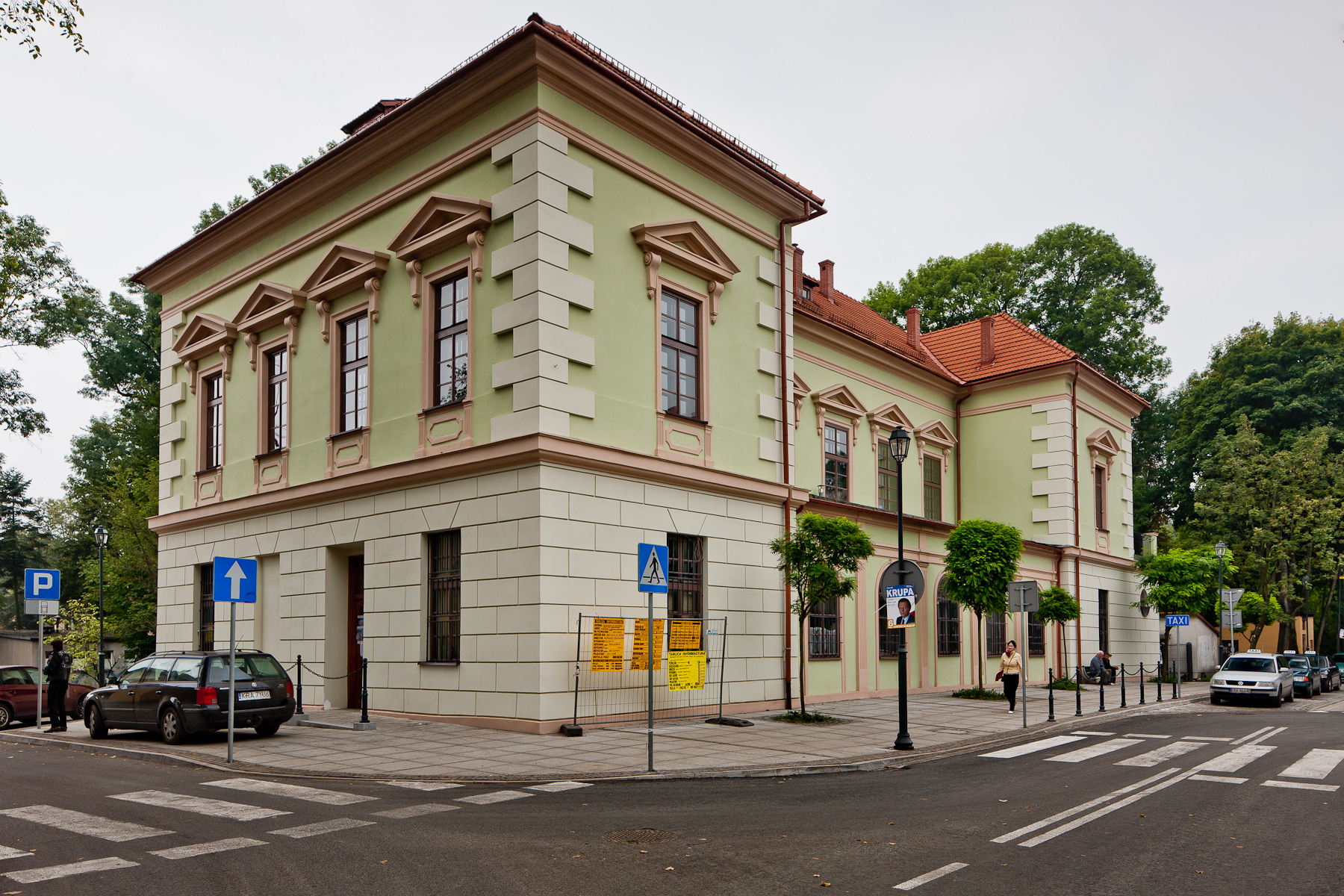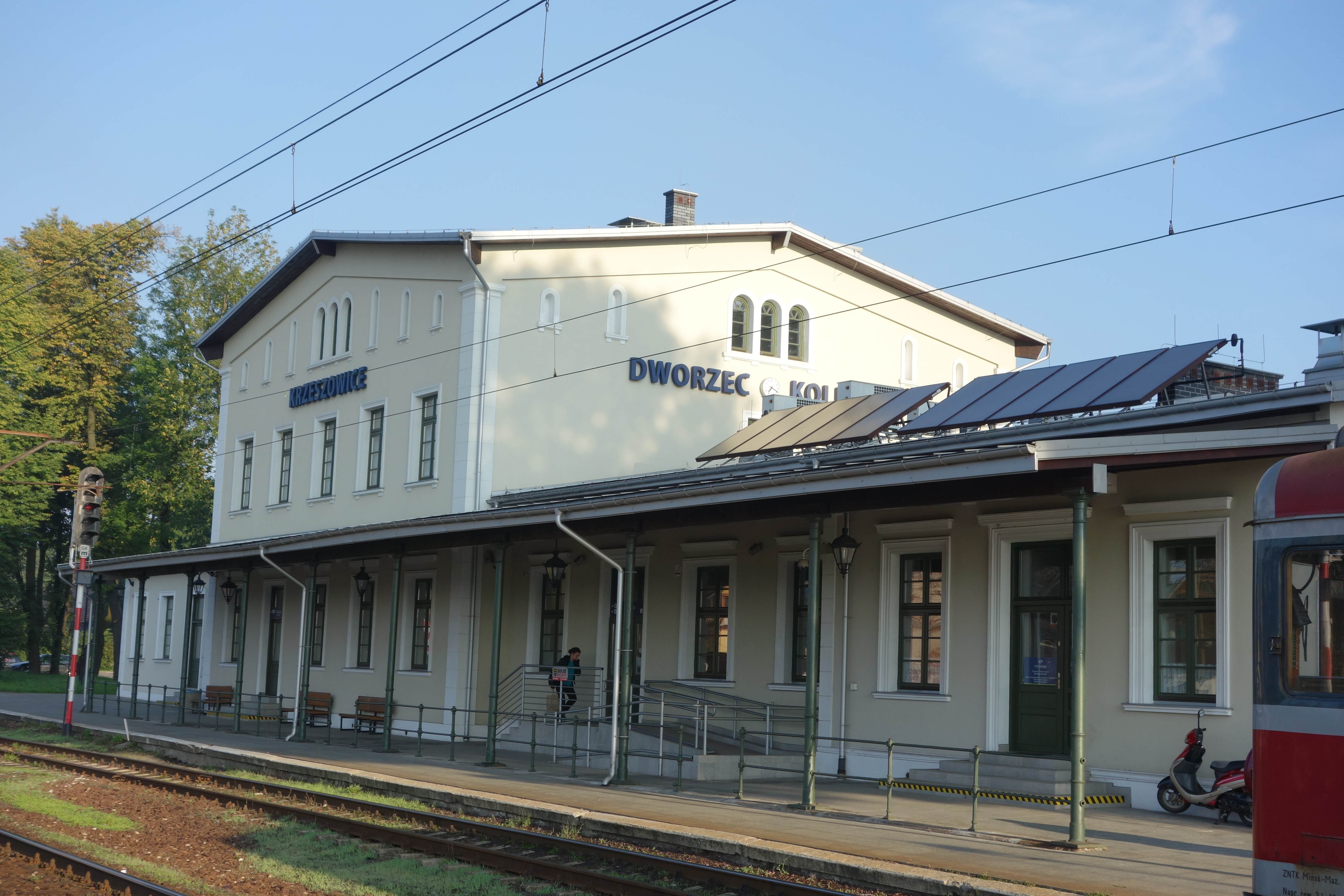Krzeszowice on:
[Wikipedia]
[Google]
[Amazon]
 Krzeszowice (german: 1941-45 Kressendorf) is a town in southern
Krzeszowice (german: 1941-45 Kressendorf) is a town in southern
 A hospital was opened here in 1829, a shelter for the poor in 1843, and in 1844, neo-Gothic church was built. In 1847 Krzeszowice received a rail station, along the newly built route from Kraków to
A hospital was opened here in 1829, a shelter for the poor in 1843, and in 1844, neo-Gothic church was built. In 1847 Krzeszowice received a rail station, along the newly built route from Kraków to
 * Roman Catholicism (The St. Martin's Church, Grunwaldzka Street 2)
* Jehovah's Witnesses (Congregation Krzeszowice, Kościuszki Street 49)
* Roman Catholicism (The St. Martin's Church, Grunwaldzka Street 2)
* Jehovah's Witnesses (Congregation Krzeszowice, Kościuszki Street 49)Congregation Krzeszowice (Official Web Site of Jehovah’s Witnesses)
/ref>
Krzeszowice official site
Unofficial Forum in Krzeszowice
Photos from Krzeszowice
Jewish Community in Krzeszowice
on Virtual Shtetl {{Authority control Cities and towns in Lesser Poland Voivodeship Kraków County Kingdom of Galicia and Lodomeria Kraków Voivodeship (1919–1939) Holocaust locations in Poland
 Krzeszowice (german: 1941-45 Kressendorf) is a town in southern
Krzeszowice (german: 1941-45 Kressendorf) is a town in southern Poland
Poland, officially the Republic of Poland, is a country in Central Europe. It is divided into 16 administrative provinces called voivodeships, covering an area of . Poland has a population of over 38 million and is the fifth-most populou ...
, situated in the Lesser Poland Voivodeship. As of 2004, its population was 9,993. Krzeszowice belongs to ''Kraków Metropolitan Area'', and lies 25 kilometers west of the center of the city of Kraków
Kraków (), or Cracow, is the second-largest and one of the oldest cities in Poland. Situated on the Vistula River in Lesser Poland Voivodeship, the city dates back to the seventh century. Kraków was the official capital of Poland until 1596 ...
. The town has a rail station, on a major route from Kraków to Katowice, and lies along National Road Nr. 79, which goes from Warsaw
Warsaw ( pl, Warszawa, ), officially the Capital City of Warsaw,, abbreviation: ''m.st. Warszawa'' is the capital and largest city of Poland. The metropolis stands on the River Vistula in east-central Poland, and its population is officia ...
to Bytom. In 1928–1966 the town had the status of a spa. Krzeszowice has a sports club called ''Świt'', founded in 1923.
Krzeszowice is located in southern part of the Kraków-Częstochowa Upland, with numerous caves and valleys in the area. In 1981, when the ''Complex of Jura Landscape Parks'' was created, three parks from the gmina of Krzeszowice were added to it (''Rudnia Landscape Park, Tenczynek Landscape Park'' and ''Kraków Valleys Landscape Park''). In 2008, it was selected with 19 villages of Europe - Germany, Poland, Italy and Spain - for the Spanish documentary film "Villages of Europe" Pueblos de Europa, produced by Juan Frutos (Colours Communication Group) and Orange Productions S.L.
History
First mention of Krzeszowice comes from 1286, when Bishop of Kraków, Paweł z Przemankowa, allowed a man named Fryczek Freton to locate the village of ''Cressouicy''. By 1337, Krzeszowice already had a wooden church of St. Martin. In the mid-15th century, it had a school and a public house. In 1555, Krzeszowice belonged to Stanisław Tęczynski, then it was owned by several noble families - the Sieniawski family, Opaliński family,Czartoryski family
The House of Czartoryski (feminine form: Czartoryska, plural: Czartoryscy; lt, Čartoriskiai) is a Polish princely family of Lithuanian- Ruthenian origin, also known as the Familia. The family, which derived their kin from the Gediminids dyna ...
, Lubomirski family and, since 1816, the Potocki family
The House of Potocki (; plural: Potoccy, male: Potocki, feminine: Potocka) was a prominent Polish noble family in the Kingdom of Poland and magnates of the Polish–Lithuanian Commonwealth. The Potocki family is one of the wealthiest and ...
.
In the early 17th century, the advantages of local mineral water
Mineral water is water from a mineral spring that contains various minerals, such as salts and sulfur compounds. Mineral water may usually be still or sparkling (carbonated/effervescent) according to the presence or absence of added gases.
T ...
were discovered by Krzeszowice parish priest, reverend Bernard Bocheński, who mentioned it in the 1625 parish records. In 1778, Prince August Czartoryski opened here first baths, and soon afterwards, patients began visiting Krzeszowice. In 1783–1786, the ''Vauxhall Palace'' was built, and in 1819, the ''Green Bath'' was opened. Krzeszowice began to prosper, in 1809–1815 and 1855–1867, the town was the seat of a county. In 1815–1846, Krzeszowice belonged to the Free City of Kraków
Free may refer to:
Concept
* Freedom, having the ability to do something, without having to obey anyone/anything
* Freethought, a position that beliefs should be formed only on the basis of logic, reason, and empiricism
* Emancipate, to procure ...
, and to Austria in 1846-1918 within the Grand Duchy of Cracow, Chrzanow ''Bezirkshauptmannschaft''.
 A hospital was opened here in 1829, a shelter for the poor in 1843, and in 1844, neo-Gothic church was built. In 1847 Krzeszowice received a rail station, along the newly built route from Kraków to
A hospital was opened here in 1829, a shelter for the poor in 1843, and in 1844, neo-Gothic church was built. In 1847 Krzeszowice received a rail station, along the newly built route from Kraków to Mysłowice
Mysłowice ( szl, Myslowicy; german: Myslowitz) is a city in Silesia in southern Poland, near Katowice. The population of the city is 74,085.
It is located in the south district of the Upper Silesian Metropolitan Union in the Silesian Highlan ...
. Local residents took part in the Kraków Uprising
The Kraków uprising ( Polish: ''powstanie krakowskie'', ''rewolucja krakowska''; German: ''Krakauer Aufstand''; Russian: ''краковское восстание'') of 1846 was an attempt, led by Polish insurgents such as Jan Tyssowski and ...
, and helped Polish rebels from Russian-controlled Congress Poland, during the January Uprising. In 1850–1855, the ''Potocki Palace'' was built, in the Italian Renaissance style, together with English garden. The palace with all its details was not completed until 1870.
By 1910, the population of Krzeszowice was 2619, out of which Jews made 18%. The town continued to develop, with several new enterprises opened here in the late 19th and early 20th century. On December 3, 1924, Krzeszowice was officially incorporated as a town. New districts and blocks of flats were built, and by 1931, the population grew to 3,391. During World War II
World War II or the Second World War, often abbreviated as WWII or WW2, was a world war that lasted from 1939 to 1945. It involved the vast majority of the world's countries—including all of the great powers—forming two opposing ...
Krzeszowice belonged to the General Government. The ''Potocki Palace'' was restored by polish slave laborer by order of Nazis and renamed by Germans into ''Haus Kressendorf'', becoming summer residence of Hans Frank
Hans Michael Frank (23 May 1900 – 16 October 1946) was a German politician and lawyer who served as head of the General Government in Nazi-occupied Poland during the Second World War.
Frank was an early member of the German Workers' Party ...
. Almost all Jewish citizens were murdered in the Holocaust
The Holocaust, also known as the Shoah, was the genocide of European Jews during World War II. Between 1941 and 1945, Nazi Germany and its collaborators systematically murdered some six million Jews across German-occupied Europe; ...
. The German occupation of Krzeszowice ended on 19 January 1945.
Landmarks
Architecture
* St. Martin's Church in the Neo-Gothic style * Potocki Palace * Vauxhall PalaceParks and gardens
* Potocki GardensMuseums and galleries
*The Museum of Krzeszowice Land, a small art gallery with art, objects and furniture.Religion
 * Roman Catholicism (The St. Martin's Church, Grunwaldzka Street 2)
* Jehovah's Witnesses (Congregation Krzeszowice, Kościuszki Street 49)
* Roman Catholicism (The St. Martin's Church, Grunwaldzka Street 2)
* Jehovah's Witnesses (Congregation Krzeszowice, Kościuszki Street 49)/ref>
References
External links
Krzeszowice official site
Unofficial Forum in Krzeszowice
Photos from Krzeszowice
Jewish Community in Krzeszowice
on Virtual Shtetl {{Authority control Cities and towns in Lesser Poland Voivodeship Kraków County Kingdom of Galicia and Lodomeria Kraków Voivodeship (1919–1939) Holocaust locations in Poland